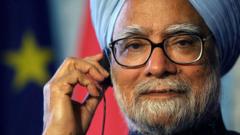Remembering the life of Manmohan Singh, India's former prime minister, brings to light a leader who combined gentleness with strength. Often described as quiet and kind, Singh's impact on the nation is profound. He held a state funeral recently, marking a seven-day mourning period in India.
Throughout his career, which included stints as Finance Minister and central bank governor, Singh was not known for flamboyance. Instead, he focused on substantial results, spearheading pro-market reforms that integrated India into the global economy. His modest approach earned him both admiration and criticism, but he always adhered to the strains of integrity.
Born in what is now Pakistan, he was the first Sikh to occupy the prime minister's office. Singh's education at prestigious universities shaped his economic outlook and earned him respect among the middle classes. Notably, in a bold moment, he apologized for the 1984 Sikh riots, which touched many and showcased his capacity for empathy.
Singh faced considerable criticism, sometimes labeled a 'puppet' leader. Yet, he made historical strides, notably signing the US-India nuclear deal, which defied opposition fears. His leadership during the global financial crisis helped insulate India, further establishing his reputation as a strong but cautious leader.
However, challenges mounted late in his career. Corruption allegations affected his administration's popularity, and his handling of public protests and crises drew scrutiny. The pressures intensified after the Mumbai attacks in 2008, raising questions about his security strategy and governance.
Despite his struggles, Manmohan Singh's legacy endures as a symbol of steadfastness amidst the chaos of politics. He emphasized policies benefiting the middle-class and maintained an aura of personal dignity. Ultimately, he remains a figure of resilience and compassion, proving that strength can manifest in soft-spoken leadership.





















